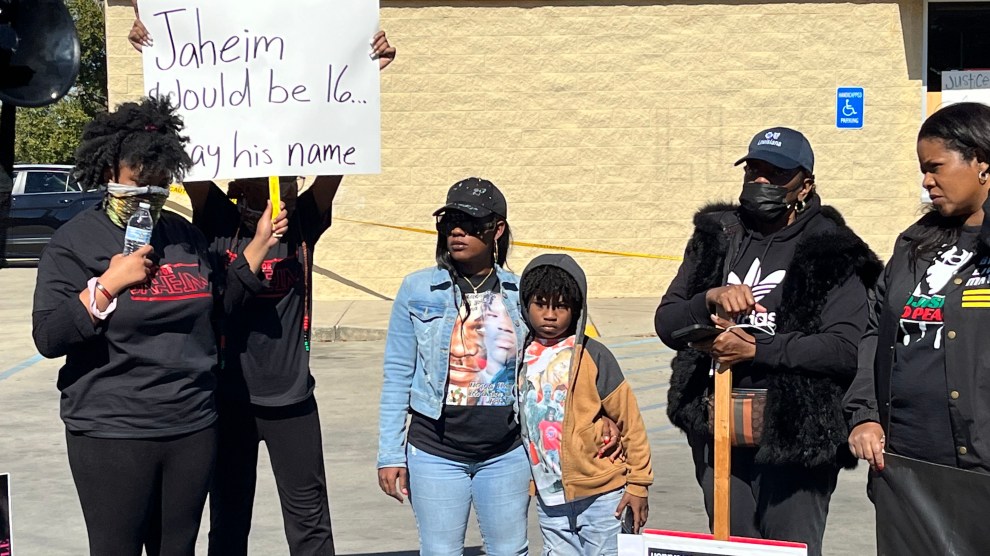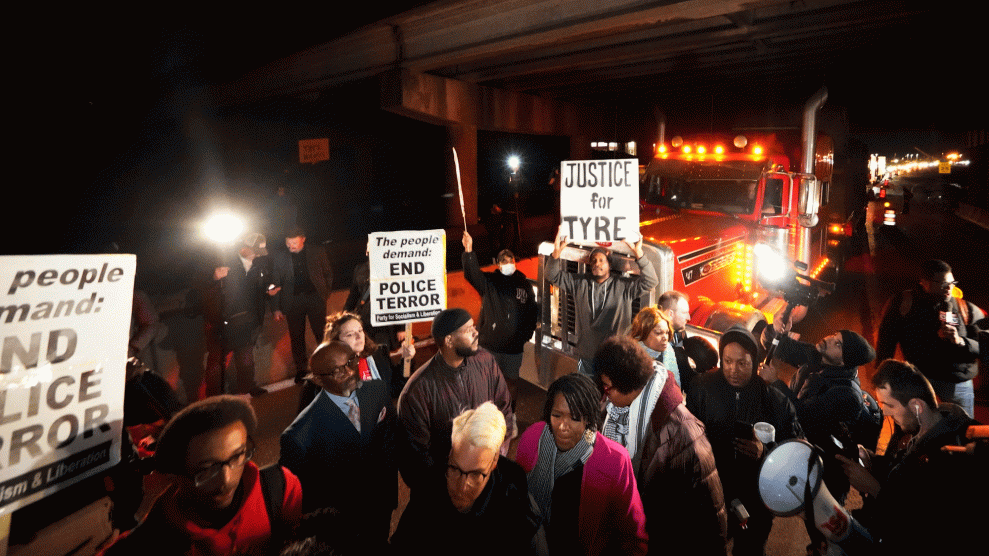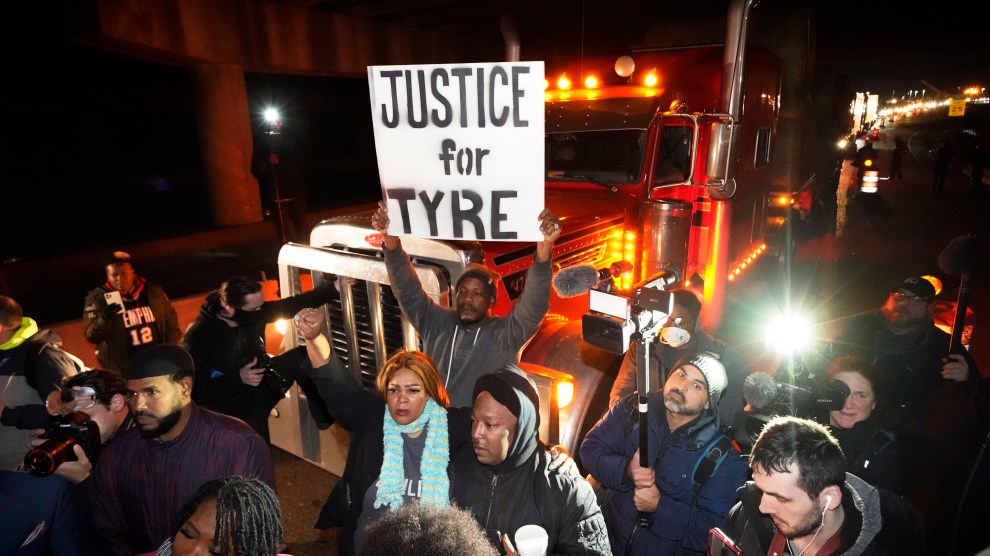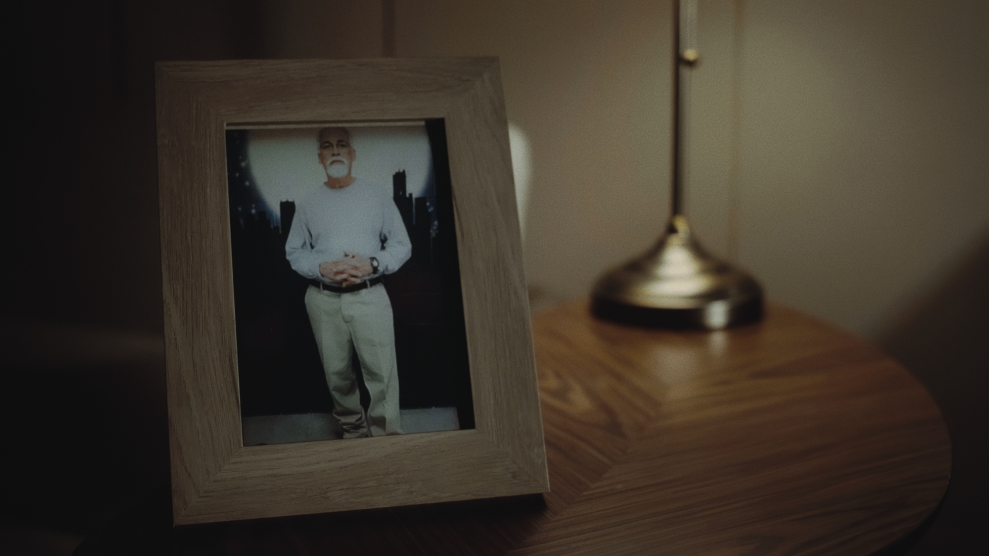
Center in jean jacket, Katrina Mateen, whose son Jaheim McMillan was shot and killed by police, stands with McMillan's younger brother at a protest outside a Family Dollar store in Gulfport, Mississippi.Samantha Michaels/Mother Jones
Outside a Family Dollar store in Gulfport, Mississippi, a stream of cars enter a parking lot. It is early February, a Saturday, but no one is here to shop.
Katrina Mateen, 41, stands with her back toward the store’s entrance, where a cluster of teddy bears, fake flowers, and tea candles sit in the sun. The belongings, faded from weeks of winter weather, are a makeshift memorial for her son Jaheim McMillan, who was shot in the head by police outside the store last October, when he was just 15 years old.
There are a lot of questions about the killing. The Gulfport police say McMillan turned toward officers after they instructed him to drop a weapon. But witnesses say he was unarmed when an officer shot him, and that he went several minutes without medical care as blood poured from his head. “I did not see a gun on him,” Deborah Stout, an Uber driver who witnessed the shooting, said in a video posted on Facebook. “He was coming out of the store with his hands up.”
Four months later, amid conflicting accounts, the city still has not released body-cam footage of the incident or even named the officer who pulled the trigger. McMillan’s family and supporters have no way to determine what actually happened. “It’s been agonizing” to go so long without the information, Mateen tells me. “For them not to release it to the public, like they should, it lets me know they’re trying to hide something.”
The protest comes about a week after people around the country watched body-cam videos of officers in another city, Memphis, killing a 29-year-old Black motorist, Tyre Nichols. Though officers initially claimed Nichols reached for one of their weapons during a “confrontation,” the footage did not bear that out. Instead, it showed them unnecessarily beating, tasing, and pepper-spraying him as he repeatedly called out for his mother and at times seemed on the verge of losing consciousness. The Memphis police department released the video of his beating within a month and promptly fired several of the involved officers, at least five of whom are now charged with murder.
In Gulfport, the protesters have come from surrounding states to demand similar transparency. Some of them point out that most of the officers in Memphis were Black, and that white officers often don’t face the same punishments. “If those [Memphis] officers were white, we’d still be demanding they release the tapes, like we’re here demanding for Jaheim,” says Bianca Austin, whose niece Breonna Taylor was killed by police in a botched raid in Louisville, Kentucky, in 2020.
Austin has been offering emotional support to McMillan’s mother for months since the shooting outside the Family Dollar, traveling to Mississippi alongside her fiance, Cortez Rice, from Minneapolis. “We need that same accountability across the nation,” Rice says. “For all stolen lives.”
McMillan’s case is now in the hands of the state Attorney General’s Office and the Mississippi Bureau of Investigation, which is tasked with investigating all fatal police shootings in the state. The bureau has a long history of denying body-cam footage and other details to the public, as Kayode Crown reported for the Mississippi Free Press. As a policy, the agency won’t even release an officer’s name until after an indictment.
In 2021, state officials suggested they wanted to be more forthcoming with evidence after police killings. “As more and more of these incidents of officer-involved shootings are shared with the public in other parts of the country, I believe we need to be more transparent here in Mississippi as well,” Public Safety Commissioner Sean Tindell told the Biloxi Sun Herald, adding that he directed the Bureau of Investigation to be more responsive to public records requests after people die in custody. “If you…maintain a cloak of secrecy, then it lends itself to conspiracy theories and incorrect assumptions,” he added. “I believe the public should have a right to view the footage and understand exactly what happened.”
There’s no national rule for how quickly investigators must share body-cam footage or officers’ names. A Department of Justice guidance in 2016 vaguely noted that after police shootings, “the longer the law enforcement agency withholds this information, the greater the appearance that the agency is protecting its own personnel at the expense of transparency within the community.” The guidance added that releasing officers’ names within 48 hours would offer “sufficient time” for the police department to contact the deceased person’s family and for the officers to make accommodations if they fear their safety may be threatened by public protests.
In California, police must release video of “critical incidents” within 45 days. New York City and Washington, DC, have deadlines of 30 days and 5 days, respectively. In some states, there’s no deadline at all. In Montgomery, Alabama, for example, it’s been four years since a police dog bit and killed Joseph Pettaway, and the public still hasn’t seen the video. Elsewhere in Alabama, as AL.com reporter Ashley Remkus wrote, a police department withheld footage of an officer killing even as the agency asked taxpayers to cover the legal bills for the officer’s murder trial. The family of Glenn Foster, a Black former NFL player who died in 2021 after he was found unresponsive in a police cruiser in Pickens County, Alabama, is also waiting for evidence.
“If we don’t have video, the cops are right, until we prove them wrong,” Foster’s mother, Sabrina Foster, tells me in Gulfport. She has traveled here for the protest to demand justice for McMillan. “Until we prove them wrong, we’re automatically guilty: The Black man is always wrong.”
In Gulfport, authorities allowed Mateen, McMillan’s mother, to view at least a partial video clip of the shooting in December. She tells me she’s not sure exactly where the clip came from—maybe dash-cam or the body-cam of a nearby officer. But it was short—just seconds long, she estimates—and far from conclusive. She says it did not corroborate the police’s claim that her son turned toward officers with a gun, and that it looked edited, not matching up with surveillance footage from across the street that seemed to show McMillan running away from officers. She wants to see all the available footage, unedited.
The police “are contradicting everything the witnesses are saying and not providing any proof,” she tells me. “And that’s really all I want: for them to release the video, to show the public.” (In December, Public Safety Commissioner Tindell told WLOX News Now, a local television station, that McMillan’s family had been shown both a slow-motion version of the video and one that had not been edited.)
In the days after the shooting, Gulfport Police Chief Adam Cooper said evidence would be released to the public after the investigation had been concluded. Gulfport Mayor Billy Hewes recently said he believed body-cam footage would be shared by the end of the month, after several protesters were arrested for entering City Hall and demanding it. But Mateen and others are skeptical, noting that the mayor has made similar assurances in the past that did not pan out. “It means nothing,” Yolanda Shelton, a protester with the Southern Region New Black Panther Party, tells me of the mayor’s claim. “They won’t release it.”
In the parking lot, Mateen, who is Black, wears a hat and big sunglasses that cover much of her face—she says she cries most days, wondering what happened to her son. He would have turned 16 this month. The protesters march into the street and take over a lane of traffic as they sing Happy Birthday.
Here’s Breonna Taylor’s aunt Bianca Austin, leading protesters in the street to sing happy birthday to Jaheim McMillan, a 15-year-old who was shot in the head by police in October. He would have been 16 this week. pic.twitter.com/KH1J6iBZeA
— Samantha Michaels (@sjmichaels) February 4, 2023
“If they don’t release their body camera by the end of the month,” Mateen tells me afterward, “they definitely will be seeing us next month” at another protest.
“Because if the public is seeing something and the police are saying another thing, I’m gonna believe the public,” she adds. “I really don’t believe the police.”
This story has been updated with a comment from Public Safety Commissioner Sean Tindell about the footage shown to McMillan’s family in December.
















